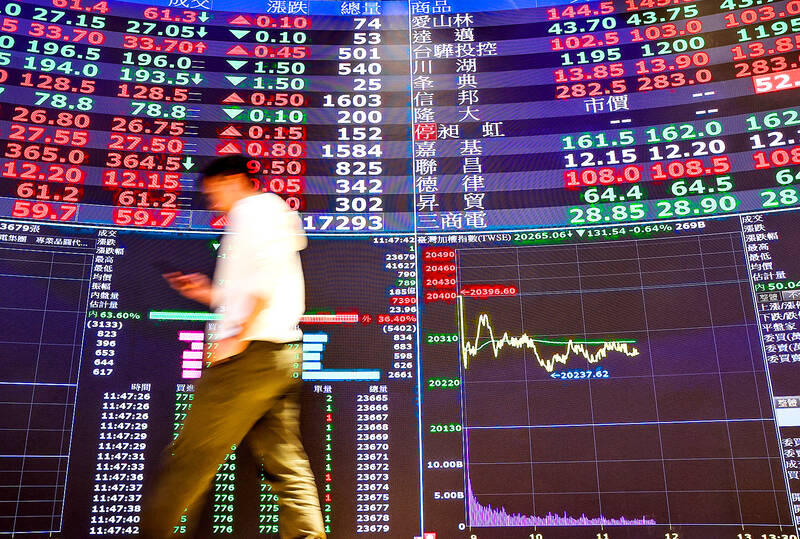US investors would be prohibited from trading TAIEX futures by the US securities regulator from as early as July 29 due to a classification of the TAIEX as a so-called “narrow-based security index,” the Financial Supervisory Commission (FSC) said on Tuesday.
The heavy weighting of contract chipmaker Taiwan Semiconductor Manufacturing Co (TSMC, 台積電) has prompted the TAIEX futures to hit criteria set by the US Commodity Futures Trading Commission (CFTC).
Therefore the CFTC is expected to ban US investors from trading TAIEX futures and mini-TAIEX futures.

Photo: CNA
TAIEX futures and mini-TAIEX futures have different contract terms, including value and deposits, but their underlying index is the TAIEX.
From Feb. 15 to Monday, TSMC, the most heavily weighted stock in the local market, had accounted for more than 30 percent of the local main board’s total turnover for 45 trading sessions in a row, which led the TAIEX to meet one of the criteria set by the CFTC defining it as a narrow-based security index.
Due to TSMC’s heavy weighting, the CFTC would soon be informed by the Taiwan Futures Exchange that the exchange has met the criteria to be classified as a narrow-based security index, Securities and Futures Bureau Deputy Director-General Julian Hwang (黃厚銘) said on Tuesday, adding that the exchange awaits a response from the CTFC regarding revoking trading permissions of TAIEX futures and mini-TAIEX futures, he said.
The CFTC’s revoking of the trading permission for TAIEX futures and mini-TAIEX futures would likely be implemented on July 29 because of a three-month grace period, Huang said.
US investors make up only 0.7 percent of the transactions in Taiwan’s futures markets, Huang said.
Many investors in the US markets belong to multinational groups, which allow them to trade TAIEX futures through overseas affiliates, he said.
The impact of the revoking on the local equity market is expected to be minimal, he added.
However, past experiences indicate the impact could be more serious.
In April 2021, the CFTC revoked TAIEX futures and mini-TAIEX futures trading permissions, also because TSMC’s heavy weighting led the TAIEX to be classified as a narrow-based security index.
The trading permissions were not regranted until October 2022. During the period, the TAIEX fell from 16,571 to 12,856.
It is unlikely that the FSC would impose a weighting ceiling on a single stock to avoid a CFTC ban, Huang said.
However, Taiwan Futures Exchange officials would make more visits to foreign institutional investors to encourage them to participate in the local futures markets, he said.

Taiwan Semiconductor Manufacturing Co (TSMC, 台積電) yesterday said that its investment plan in Arizona is going according to schedule, following a local media report claiming that the company is planning to break ground on its third wafer fab in the US in June. In a statement, TSMC said it does not comment on market speculation, but that its investments in Arizona are proceeding well. TSMC is investing more than US$65 billion in Arizona to build three advanced wafer fabs. The first one has started production using the 4-nanometer (nm) process, while the second one would start mass production using the

A TAIWAN DEAL: TSMC is in early talks to fully operate Intel’s US semiconductor factories in a deal first raised by Trump officials, but Intel’s interest is uncertain Broadcom Inc has had informal talks with its advisers about making a bid for Intel Corp’s chip-design and marketing business, the Wall Street Journal reported, citing people familiar with the matter. Nothing has been submitted to Intel and Broadcom could decide not to pursue a deal, according to the Journal. Bloomberg News earlier reported that Taiwan Semiconductor Manufacturing Co (TSMC, 台積電) is in early talks for a controlling stake in Intel’s factories at the request of officials at US President Donald Trump’s administration, as the president looks to boost US manufacturing and maintain the country’s leadership in critical technologies. Trump officials raised the

‘SILVER LINING’: Although the news caused TSMC to fall on the local market, an analyst said that as tariffs are not set to go into effect until April, there is still time for negotiations US President Donald Trump on Tuesday said that he would likely impose tariffs on semiconductor, automobile and pharmaceutical imports of about 25 percent, with an announcement coming as soon as April 2 in a move that would represent a dramatic widening of the US leader’s trade war. “I probably will tell you that on April 2, but it’ll be in the neighborhood of 25 percent,” Trump told reporters at his Mar-a-Lago club when asked about his plan for auto tariffs. Asked about similar levies on pharmaceutical drugs and semiconductors, the president said that “it’ll be 25 percent and higher, and it’ll

CHIP BOOM: Revenue for the semiconductor industry is set to reach US$1 trillion by 2032, opening up opportunities for the chip pacakging and testing company, it said ASE Technology Holding Co (日月光投控), the world’s largest provider of outsourced semiconductor assembly and test (OSAT) services, yesterday launched a new advanced manufacturing facility in Penang, Malaysia, aiming to meet growing demand for emerging technologies such as generative artificial intelligence (AI) applications. The US$300 million facility is a critical step in expanding ASE’s global footprint, offering an alternative for customers from the US, Europe, Japan, South Korea and China to assemble and test chips outside of Taiwan amid efforts to diversify supply chains. The plant, the company’s fifth in Malaysia, is part of a strategic expansion plan that would more than triple